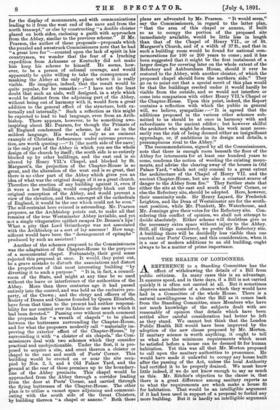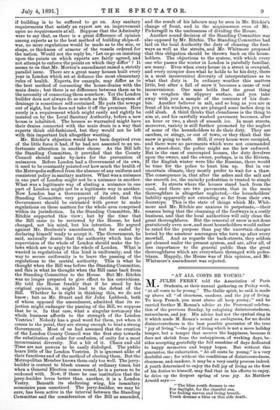THE HEALTH OF LONDONERS.
AREFERENCE to a Standing Committee has the effect of withdrawing the details of a Bill from public criticism. In many cases this is an advantage. It ensures speed, and in these days, if a Bill is not carried quickly it is often not carried at all. But it sometimes deprives amendments of a chance which they would have had in a Committee of the whole House. There is a natural unwillingness to alter the Bill as it comes back from the Standing Committee, since Members who have not much knowledge of the subjects dealt with are reasonably of opinion that details which have been settled after careful consideration had better be left as they stand. We cannot but think that the London Public Health Bill would have been improved by the adoption of the new clause proposed by Mr. Morton. If sanitary science is worth anything, it ought to tell us what are the minimum requirements which must be satisfied before a house can be deemed fit for human habitation. Yet this was all that Mr. Morton proposed to call upon the sanitary authorities to pronounce. He would have made it unlawful to occupy any house built after the passing of the Act, unless the local Authority had certified it to be properly drained. We must know little indeed, if we do not know enough to say as much as this. Mr. Ritchie's objection to the clause is, that there is a great difference among sanitary experts as to what the requirements are which make a house fit for habitation. That would be an intelligible argument if it had been used in support of a proposal to forbid any more building. But it is hardly an intelligible argument if building is to be suffered to go on. Any sanitary requirements that satisfy an expert are an improvement upon no requirements at all. Suppose that the Admiralty were to say that, as there is a great difference of opinion among experts as to the best method of building ships-of- war, no more regulations would be made as to the size, or shape, or thickness of armour of the vessels ordered for the nation. Would not the reply be, Let us go on insisting upon the points on which experts are fairly agreed, and not attempt to enforce the points on which they differ' ? It seems to us that Mr. Morton's amendment raised a strictly parallel issue. There are a great many houses built every year in London which set at defiance the most elementary rules of health. Experts, for example, may differ as to the best method of connecting the house-drains with the main drain ; but there is no difference between them as to the necessity of connecting them somehow. Yet the London builder does not always do so much as this. His system of drainage is sometimes self-contained. He puts the sewage out of sight, but he does not take it off the premises. Here surely is a requirement which might easily and rightly be insisted on by the Local Sanitary Authority, before a new house is inhabited. The houses so warranted might have their drains connected. with the main drain in a way that experts think old-fashioned, but they would not be left with this important link altogether wanting. Mr. Ritchie's objection would have been deprived even of the little force it had, if he had not assented to an un- fortunate alteration in another clause. As the Bill left the Standing Committee, it provided that the County Council should make by-laws for the prevention of nuisances. Before London had a Government of its own, it used to be constantly pointed out how much the health of the Metropolis suffered from the absence of any uniform and consistent policy in sanitary matters. What was a nuisance in one part of London might not be a nuisance in another. What was a legitimate way of abating a nuisance in one part of London might not be a legitimate way in another. Now London has a Government of its own, and the Standing Committee very properly decided that this Government should be entrusted with power to make regulations on these matters for the whole area comprised within its jurisdiction. In the Standing Committee, Mr. Ritchie supported this view; but by the time that the Bill came to be reviewed by the House, he had changed, not his mind, but his intention. He argued against Mr. Boulnois's amendment, but he ended by declaring himself ready to accept it. The Government, he said, naturally desire that the authority which has the supervision of the whole of London should make the by- laws which are to apply to the whole of London. What is wanted in regulations of this kind is uniformity, and the way to secure uniformity is to leave the passing of the regulations to the central authority. This is what he thought when the Bill was before the Standing Committee, and this is what he thought when the Bill came back from the Standing Committee to the House. But Mr. Ritchie was no longer prepared to give effect to his convictions. He told the House frankly that if he stood by his original opinion, it might lead to the defeat of the Bill. Whether he is right in thinking this, we do not know ; but as Mr. Stuart and Sir John Lubbock, both of whom opposed the amendment, admitted that its re- jection might endanger the passing of the Bill, we suppose that he is. In that case, what a singular testimony the whole business affords to the strength of the London Vestries ! Nobody has a good word for them, yet when it comes to the point, they are strong enough to beat a strong Government. Most of us had assumed that the creation of the London County Council was the first step towards the substitution of order for confusion, of unity for a most inconvenient diversity. Not a bit of it. Chaos and old Time are not powers to be easily dislodged. The public hears little of the London Vestries. It is ignorant alike of their functions and of the method of electing them. But the Metropolitan Member knows them only too well. The jerry- builder is content to blush unseen at ordinary times, but when a General Election comes round, he is a person to be reckoned with. Now, if there be one institution that the jerry-builder loves better than another, it is a London Vestry. Beneath its sheltering wing, his insanitary economies pass unnoticed. The jerry-builder, we may be sure, has been active in the interval between the Standing Committee and the consideration of the Bill as amended, and the result of his labours may be seen in Mr. Ritchie's change of front, and in the acquiescence even of Mr. Pickersgill in the uselessness of dividing the House. Another sound decision of the Standing Committee was also opposed by Mr. Ritchie. The Standing Committee had laid on the local Authority the duty of cleaning the foot- ways as well as the streets, and Mr. Whitmore proposed that this obligation should be thrown back on the house- holders. The objections to the system, with which every one who passes the winter in London is painfully familiar, are many. Even when every house in a street is occupied, and every occupier does what he holds to be his duty, there is a most inconvenient diversity of interpretations as to what that duty is. In ordinary weather this matters little, but after a fall of snow it becomes a cause of real inconvenience. One man holds that the great thing is to roughen the slippery surface, and you take away with you a sample of the contents of his dust- bin. Another believes in salt, and so long as you are in front of his windows, you are plunged some inches deep in cold slush. A third thinks that cleanliness is the thing to aim at, and his carefully washed pavement becomes, after an hour or two, a sheet of smooth ice. In most streets, moreover, variety is still further promoted by the neglect of some of the householders to do their duty. They are careless, or stingy, or out of town, or they think that the snow is going to melt. Still; if every house were occupied, and there were no pavements which were not commanded by a street-door, the police might see the law enforced. But in the case of unoccupied houses, the duty devolves upon the owner, and the owner, perhaps, is in the Riviera. If the English winter were like the Russian, there would be time for the police to hunt him up. But in our uncertain climate, they mostly prefer to wait for a thaw. The consequence is, that after the ashes and the salt and the smooth ice, the unlucky pedestrian is treated to simple snow. In streets where the houses stand back from the road, and there are two pavements, that in the main thoroughfare is altogether neglected,—the householders' liability apparently not extending so far from their own doorsteps. This is the state of things which Mr. Whit- more and Mr. Ritchie are anxious to perpetuate,—their reasons being that the cleansing of the footways is a costly business, and that the local authorities will only clean the great thoroughfares. But the removal of snow is not done gratuitously even now, and most householders would rather be rated for the purpose than pay the uncertain charges levied by the amateur scavengers who turn up after every snowfall. And as regards the back-streets, they seldom get cleaned under the present system, and are, after all, of less importance to the general public than the great thoroughfares which are everywhere thronged with pedes- trians. Happily, the House was of this opinion, and Mr. Whitmore's amendment was rejected.











































 Previous page
Previous page